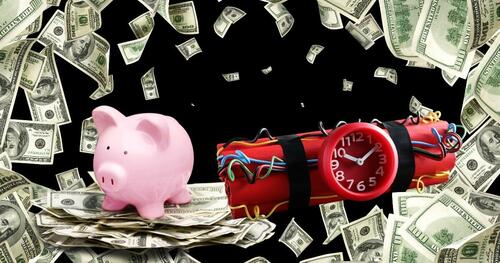Global Bankers Are Suddenly Worried About The Soaring US National Debt
In January of this year JP Morgan CEO Jamie Dimon argued in an interview with Fortune Magazine that the record US debt ‘Is a cliff…and we’re going 60MPH towards it.” He claimed that the situation was a global market rebellion waiting to happen. His comments preceded reports that the national debt was increasing by approximately $1 trillion every 100 days due to the Federal Reserve’s interest rate hikes. US debt has climbed over $11 trillion since March of 2020.
It’s a problem that bankers should have been able to predict well in advance: The inevitable Catch-22 scenario in which the Fed must either raise rates to stop inflation but cause debt to skyrocket, or, the Fed must lower rates and return to QE to alleviate debts but also trigger an even greater inflation crisis.
The bottom line? There’s no way out. While Jamie Dimon suggested the economy was headed off a cliff in another ten years, it’s likely the threat is approaching much sooner. Bank of America CEO Brian Moynihan told Fortune in February that:
‘We need to get after’ America’s $34T national debt: ‘You can either admire the problem or do something about it…’
Fed Chair Jerome Powell noted in remarks Tuesday to an audience of bankers in Amsterdam that:
“We’re running big structural deficits, and we’re going to have to deal with this sooner or later, and sooner is a lot more attractive than later…”
The Congressional Budget Office (CBO) now estimates that debt held by the public compared to GDP will rise to “an amount greater than at any point in the nation’s history,” caused by surging deficits. We witnessed the first sparks of a debt crisis in spring of 2023 with five bank failures, until the Fed stepped in and stalled the avalanche with its backstop program. The assertion by global bankers is that the next crisis will be sparked in markets (rising bond yields spilling over into equities). Jamie Dimon chimed in again on debt and deficits this past week on Sky News:
“America should be quite aware that we have got to focus on our fiscal deficit issues a little bit more, and that is important for the world…At one point it will cause a problem and why should you wait?”
“The problem will be caused by the market and then you will be forced to deal with it and probably in a far more uncomfortable way than if you dealt with it to start.”
However, Dimon glosses over the fact that ALL of America’s “growth” since the covid pandemic can be attributed to the effects of inflation, not sound financial policies. The entire system is built upon a frail foundation of more money chasing less goods and this is causing extreme problems in affordability in necessities, including housing. This is where bankers like Dimon sound far more like malicious propagandists than economic analysts.
The greater problem which most international and central bankers will deny is the threat to the US Dollar and US treasuries. An exponentially expanding debt could lead foreign investors to question if the US will be able to cover its debts, which may lead to more investment in short term treasuries over long term bonds, or a hands off approach to all dollar denominated debt instruments. A dollar crash would be the logical consequence.
Of course, one thing financial elites fail to mention is what the practical solution would be to the debt problems they describe? One might argue that this is a ploy by bankers to convince the public that a return to the printing presses is “necessary” in order to prevent a deflationary spiral. Banks would be the primary beneficiaries should the Federal Reserve bring back QE. But do markets really matter more than a re-energized inflationary freight train crushing consumers?
Maybe prices on everything need to come down? Beyond that, should the people who helped create the crisis be trusted to fix it?
Tyler Durden
Tue, 05/21/2024 – 13:25




Share This Article
Choose Your Platform: Facebook Twitter Linkedin